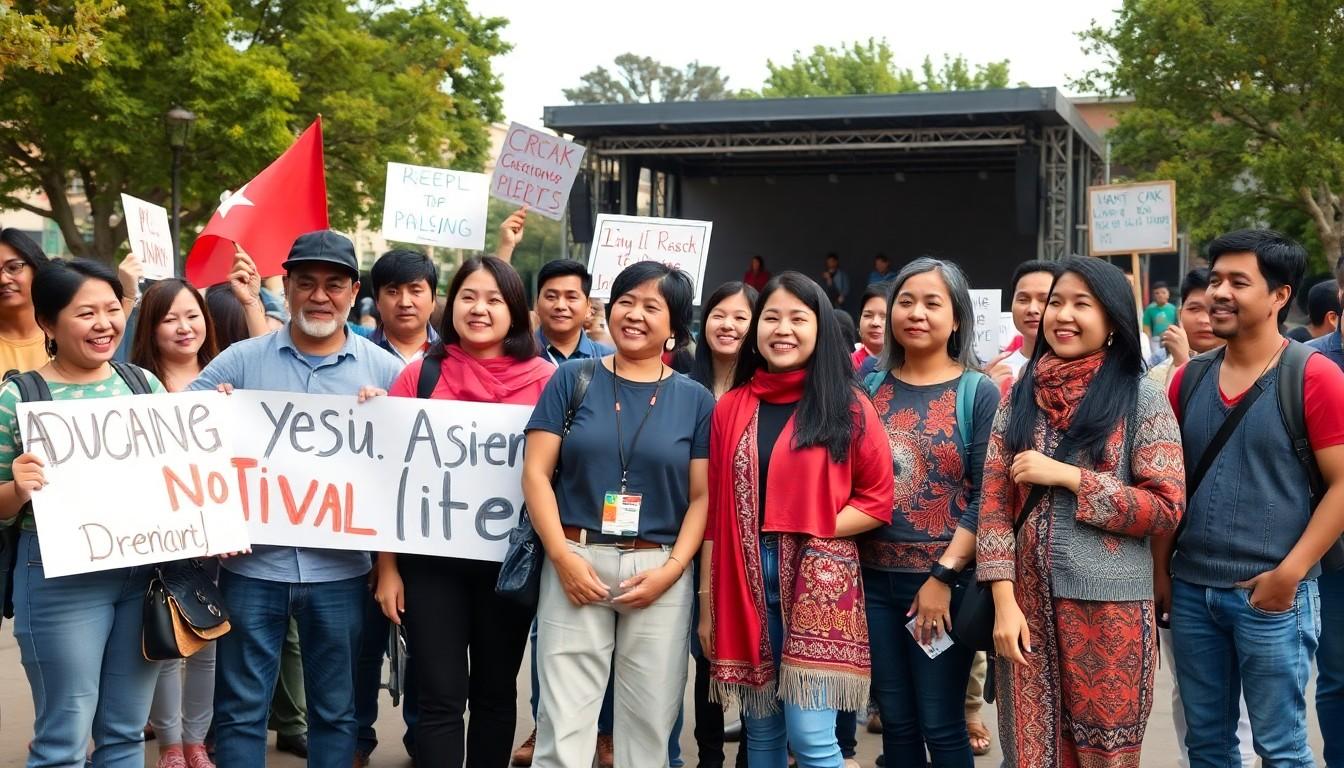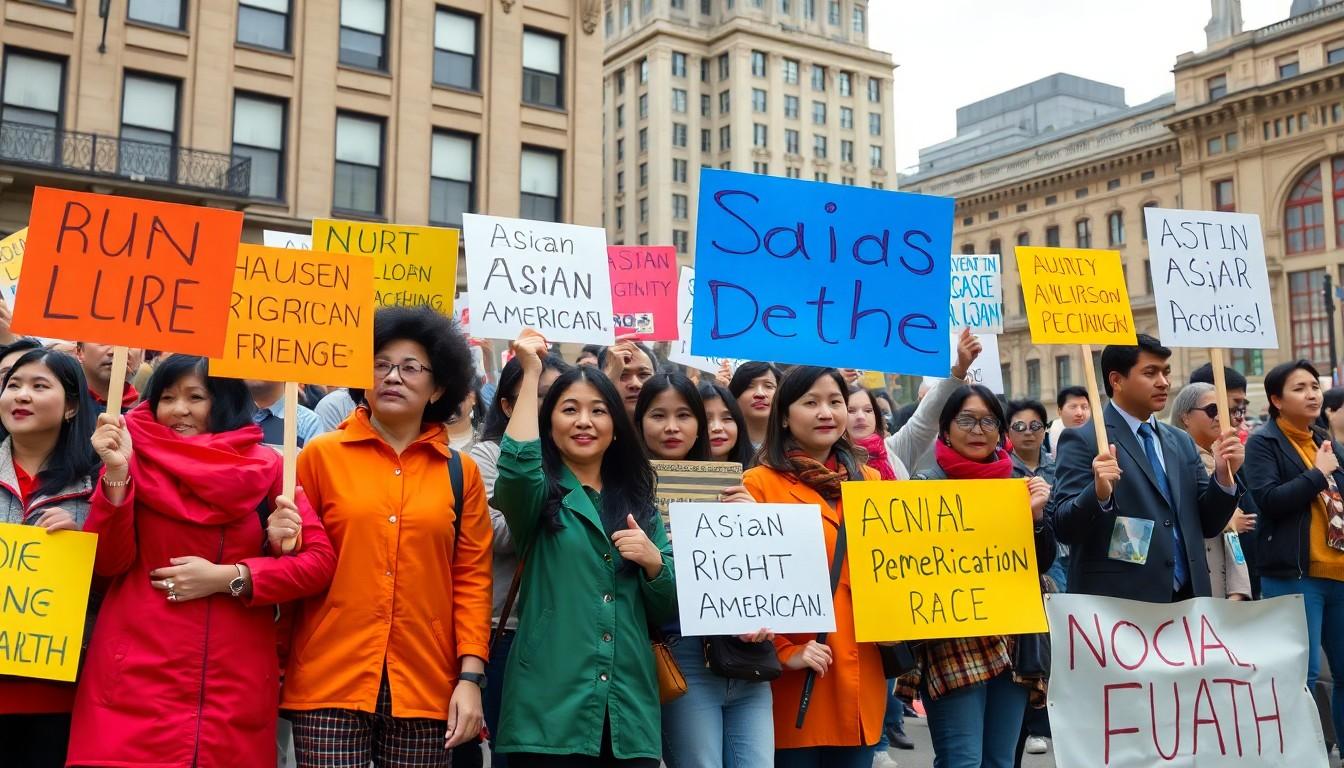The Best Fluffy Pancakes recipe you will fall in love with. Full of tips and tricks to help you make the best pancakes.

Asian American Political Alliance: Empowering Voices for Change in Politics
In a world where political alliances can feel as tangled as a bowl of spaghetti, the Asian American Political Alliance is here to untangle the mess and serve up a fresh perspective. This dynamic group isn’t just about numbers; it’s about voices, stories, and the power of community. With an ever-growing population, Asian Americans are stepping into the spotlight, demanding their place at the table and shaking things up in the process.
Overview Of Asian American Political Alliance
Asian American Political Alliance represents a significant force in political advocacy. This organization unites various Asian American communities, ensuring a collective voice in political discourse. Its members aim to address issues directly impacting their communities, including immigration reform, social justice, and economic opportunities.
Political engagement strategies include grassroots organizing and coalition building. Activists prioritize local and national elections, increasing Asian American representation. They promote awareness of Asian American issues among legislative bodies, influencing policy decisions in a variety of arenas.
Membership in the alliance consists of individuals from diverse backgrounds, reflecting the multicultural tapestry of Asian America. Collaborations exist with other civil rights organizations, amplifying efforts to address systemic inequality. Each partnership strengthens the impact of advocacy initiatives, facilitating broader community support.
Educational programs are another focus area, equipping members with tools for effective political action. Workshops cover topics like voter registration, civic engagement, and advocacy training. These resources empower community members, fostering a deeper understanding of the political landscape.
The alliance’s work transcends traditional political boundaries. It not only advocates for policy changes but also cultivates cultural pride and community solidarity. By celebrating diversity, the alliance honors the unique experiences of Asian Americans, enriching the broader narrative of social justice movements.
Historical Context

The Asian American Political Alliance emerged from a need for collective representation within the political sphere. As diverse groups faced unique challenges, unity became essential for effective advocacy.
Early Formation
Roots in activism characterized the beginning of the alliance. During the 1960s, Asian Americans recognized the need for a unified approach to address discrimination and political exclusion. Students in educational institutions led efforts to form coalitions focusing on civil rights and anti-war movements. Those engaged found strength in collaboration. The establishment of the Asian American Political Alliance occurred as a response to racial tensions and increased visibility. This foundational period set the stage for greater political engagement among Asian Americans.
Key Milestones
The alliance achieved several significant milestones in its journey. In 1972, the formation of the Asian American Studies program marked a cultural breakthrough in academia. Representation in local and national elections also gained momentum through grassroots mobilization efforts. Significant legislative victories, including the 1975 amendments to the Voting Rights Act, expanded protections for language minorities. Membership growth throughout the years demonstrated an increasing commitment to political participation. By influencing broader civil rights movements, the alliance affirmed its role as a crucial player in the quest for social justice within American society.
Major Contributions
The Asian American Political Alliance plays a vital role in advancing the interests of Asian American communities. Advocacy and legislative impact are crucial areas where the alliance has made significant strides.
Advocacy For Civil Rights
Advocacy for civil rights stands at the core of the alliance’s mission. Members actively participate in campaigns that address discrimination, police reform, and voter suppression. Educational outreach and public awareness initiatives engage Asian American communities in critical discussions about their rights. Local partnerships with civil rights organizations enhance the alliance’s efforts, facilitating comprehensive advocacy strategies. Workshops and seminars equip members with knowledge and tools to address systemic issues effectively. Moreover, a commitment to cultural identity reinforces solidarity within the community, ensuring collective voices are heard in the fight for social justice.
Impact On Legislation
Impact on legislation showcases the alliance’s effectiveness in political engagement. Significant legislative victories, including amendments to the Voting Rights Act, reflect the alliance’s influence on policy. Collaborations with lawmakers support the introduction of bills aimed at addressing immigration reform and social equity. Grassroots mobilization campaigns drive higher voter turnout, resulting in increased representation in local and national elections. Focused efforts ensure that Asian American concerns gain attention in legislative discussions. As a result, the alliance continues to shape a more inclusive political landscape for Asian Americans, advocating for policies that protect their rights and promote equality.
Current Challenges Faced
Asian American communities encounter several challenges in their pursuit of political representation and engagement. Both representation issues and community engagement efforts play crucial roles in shaping their political landscape.
Representation Issues
Representation remains a significant hurdle for the Asian American Political Alliance. Asian Americans often experience underrepresentation in political offices, which hinders their influence on policy decisions. Data shows that Asian Americans account for 6.1% of the U.S. population, yet they hold only 3% of state legislative seats. Members of the alliance emphasize the need for increased candidacy among Asian Americans. This absence in political roles limits visibility and marginalizes their unique needs and concerns. Overcoming these representation barriers requires targeted strategies that elevate Asian American voices within electoral processes.
Community Engagement
Community engagement also presents challenges for the alliance’s goals. Many Asian Americans face cultural and language barriers that restrict their participation in political activities. Engagement strategies must recognize the diversity within the Asian American population, including varying languages and cultural backgrounds. Effective outreach programs can bridge these gaps by fostering connections through workshops and community events. Alliance members highlight the importance of collaboration with local organizations to reach underrepresented groups. By enhancing accessibility to political resources, the alliance strengthens its impact and encourages broader participation in civic life.
Future Prospects
Future growth for the Asian American Political Alliance centers on enhancing political representation. They strive to increase the percentage of Asian Americans in state legislative seats, currently at 3% despite a 6.1% population share. Collaboration with various organizations will expand outreach efforts, attracting more community members to political activities.
Innovative programs are planned, targeting civic engagement through workshops and educational sessions. Members intend to overcome cultural and language barriers, making political participation more accessible for diverse groups. Partnerships with local leaders will help amplify community voices, ensuring that issues faced by Asian Americans gather greater visibility among policymakers.
Involvement in national elections presents another key focus. Increased voter turnout efforts and mobilization strategies prioritize direct engagement in electoral processes. By fostering a strong grassroots presence, the alliance aims to challenge the status quo and advocate for legislative changes that reflect community needs.
Continuous advocacy around immigration reform and social justice remains crucial. Members recognize the ongoing challenges within these areas, addressing discrimination and socioeconomic disparities effectively. Amplifying their efforts in coalitions with other civil rights organizations fortifies their position in the larger fight for equity.
A long-term vision includes the establishment of mentorship programs, supporting emerging leaders from within the community. These initiatives will nurture skills necessary for effective political action, cultivating future representatives to carry the alliance’s mission forward. Expanding the narrative of Asian American contributions to social justice will enrich the broader conversation within American political discourse, securing lasting impacts on future generations.
Conclusion
The Asian American Political Alliance stands as a vital entity in the ongoing struggle for representation and social justice. By uniting diverse voices and experiences, it cultivates a strong political presence that amplifies the needs of the Asian American community.
Through grassroots organizing and strategic partnerships, the alliance addresses critical issues while fostering civic engagement. Its commitment to education and advocacy not only empowers individuals but also strengthens the collective voice in the political arena.
As the alliance looks to the future, its focus on mentorship and innovative outreach will be essential in overcoming barriers to participation. This dedication ensures that Asian Americans continue to play an integral role in shaping a more inclusive and equitable society.
